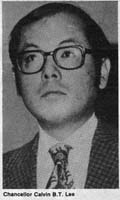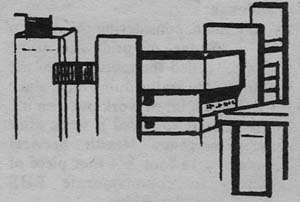During the five years after September 17, 1971, UMBC encountered internal conflict that would reshape the school's purpose forever. This date marked the beginning of the Chancellorship of Calvin B.T. Lee, and for whatever reason, it marked the beginning of a period of confusion for the young campus.

Dr. Calvin Lee, previously acting president of Boston University, was appointed to be chancellor of UMBC by the Board of Regents and authorized by University of Maryland President Wilson Elkins.
Dr. Lee was reputed to be anactive participant in higher education reform.
"In 1968 Dr. Lee came to Boston University, a large urban school, as Dean of the College of Liberal Arts and as a professor of political science. He was later named Executive Vice-president, serving only temporarily as president," the Retriever reported.
Dr. Lee received his AB degree from Columbia University, his LL.B degree from Columbia University School of Law and his LL.M and J.S.D. degrees from New York University Law School.
Close to 200 candidates were screened in an eight month nationwide search.
During that same September Vice Chancellor Schamp stepped down from his post. A search committee, with the approval of the Maryland Board of Regents, approved the appointment of Morton S. Baratz as Vice Chancellor for Academic Affairs. At the time, Baratz was Professor and Chairman of the Department of Economics and Director of the Urban Institute at Boston University.
A specialist in Urban Economics and Poverty, Baratz has authored five books, including Power and Poverty: Theory and Practice (1970).
In a Retriever interview appearing in the February 7, 1972 edition, Dr. Lee explained some of his ideas on the future of UMBC.
The chancellor and other administrators stated they were "working on a special program that would seek out academic deficiencies of incoming students and attempt to correct them before the students flunk out. Initially the program, known as 'Academic Development and Retention,' would focus on students who are 'disadvantaged by background, race, economic condition or physical infirmity'," stated Lee during the interview.

Lee also commented briefly on his views regarding faculty selection at UMBC. "We're not looking for the narrow specialist. We want one who can bridge within his discipline or hopefully outside his discipline are full professors. 'You can't run a university when most of the professors are still working on their Ph.D. and don't have the kind of growth and maturity to lead the way... It's easy to get good, fresh Ph.D.'s from the top schools in the country'." Lee said he had no plans yet for faculty hiring priority, but he wanted to emphasize an area in Urban Studies.
Lee said that appointments he would make in the next three to five years would double the faculty and 'determine the whole tone of the university for the next 20 to 30 years'."
Lee continued to comment on his prospects for UMBC's future faculty. "UMBC now suffers from a shortage of these seniors (associate and full professors) noting that of the 200 faculty now employed here, only 20
[ends]
Continue to part eighth, "Lee emphasizes job training"
Return to the series homepage